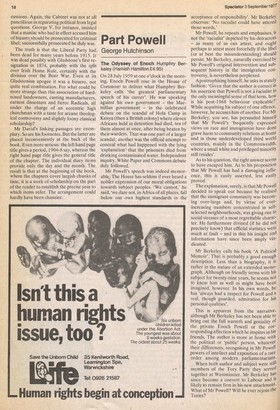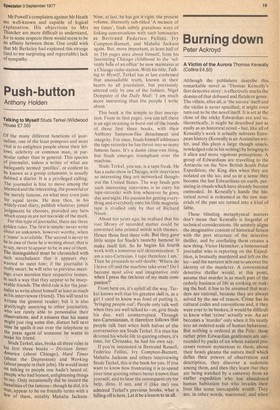Part Powell
George Hutchinson
The Odyssey of Enoch Humphry Berkeley (Hamish Hamilton £4.95) On 28 July 1959 at one o'clock in the morning, Enoch Powell rose in the House of Commons to deliver what Hum phry Berkeley calls 'the greatest parliamentary speech of his career'. He was speaking against his own government — the Macmillan government — in the celebrated debate on the scandal of Hole Camp in Kenya (then a British colony) where eleven Africans held in detention had died, ten of them almost at once, after being beaten by their warders. That was one part of a larger scandal; another was the official attempt to conceal what had happened with the lying 'explanation' that the prisoners died from drinking contaminated water. Independent inquiry, White Paper and Commons debate duly followed.
Mr Powell's speech was indeed memorable, The House has seldom if ever heard a nobler expression of our moral obligations towards subject peoples. 'We cannot,' he said, 'we dare not, in Africa of all places, fall below our own highest standards in the acceptance of responsibility'. Mr Berkeley observes: 'No racialist could have uttered those words.'
Mr Powell, he repeats and emphasises, is not the 'racialist' depicted by his detractors — as many of us can attest, and ought perhaps to attest more forcefully if the libel (or at best the misunderstanding) should persist. Mr Berkeley, naturally exercised by Mr Powell's original intervention and subsequent history in the immigration controversy, is nevertheless perplexed. Apostrophising himself, he asks in stately fashion: 'Given that the author is correct in his assertion that Rowell is not a racialist in the only meaningful sense of that term, how is his post-1968 behaviour explicable?' While acquitting his subject of one offence, however, he accuses him of another. For Mr Berkeley, you see, has persuaded himself that Mr Powell's 'frequently expressed views on race and immigration have done grave harm to community relations at home and in those underdeveloped third world countries, mainly in the Commonwealth, where a small white and privileged minority still resides'.
As to his question, the right answer seems to have escaped him. As to his proposition that Mr Powell has had a damaging influence, this is easily asserted, less easily proved. The explanation, surely, is that Mr Powell decided to speak out because he realised that the immigrant community was becoming over-large and, by virtue of everincreasing numbers concentrated in selfselected neighbourhoods, was giving rise to social stresses of a most regrettable character. He furthermore divined (if he did not precisely know) that official statistics were much at fault — and in this his insight and information have since been amply vindicated.
Mr Berkeley calls his book 'A Political Memoir'. That is probably a good enough description. Less than a biography, it is rather in the nature of an extended monograph. Although on friendly terms with his subject for twenty-nine years, he seems not to know him as well as might have been imagined, however. In his own words, he has 'always had a respect for Powell and a real, though guarded, admiration for his personal qualities'.
This is apparent from the narrative, although Mr Berkeley has not been able to bring out the full warmth and geniality of the private Enoch Powell or the corresponding affection which he inspires in his friends. The author is more at home with the political or 'public' person, whatever their differences, recognising in Mr Powell powers of intellect and exposition of a rare order among modern parliamentarians. When both author and subject were still members of the Tory Party they served together at Westminster. Mr Berkeley has since become a convert to Labour and is likely to remain firm in his new attachment. What of Mr Powell? Will he ever rejoin the Tories? Mr Powell's complaints against Mr Heath are well-known and capable of logical explanation. His objections to Mrs Thatcher are more difficult to understand, for in some respects there would seem to be an affinity between them. One could wish that Mr Berkeley had explored this strange (and to me surprising and regrettable) lack of sympathy.































 Previous page
Previous page